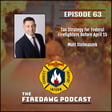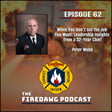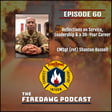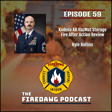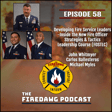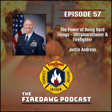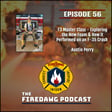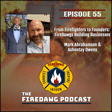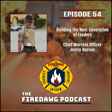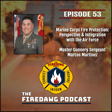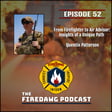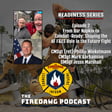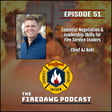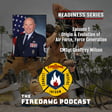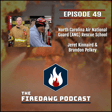Introduction of Episode 50
00:00:00
Speaker
This is the Firedog Podcast.
00:00:13
Speaker
Welcome. My name is Matt Wilson. and Thank you for joining us for episode 50 of the Firedog Podcast.
Meet Fire Chief Jason Hovelman
00:00:17
Speaker
In this episode, Chris and I have the privilege of speaking with Chief Jason Hovelman, Fire Chief of Florcent Valley Fire Protection District in North St. Louis County. Chief Hovelman has 28 years of experience in the fire service. He's held various positions, including Company Officer Battalion Chief, at now Fire Chief.
00:00:33
Speaker
He's the author of two books, No Exceptions Leadership, The Leadership Handbook, and The New Company Officer. He's also the creator of The New Company Officer Facebook page that some of you may be familiar with. The page has 40,000 followers.
Keynote Speech and Leadership Books
00:00:47
Speaker
Most recently, he was the keynote speaker at FDIC, Fire Department Instructors Conference, where he addressed the critical need for change and adaptation in the fire service.
00:00:56
Speaker
In our conversation, Chief Hovelman shares his insights on leadership, discusses his books, explores the balance between higher education and fire ground competency, and speaks about the importance of change and adaptation among other important topics. It is my pleasure to welcome Chief Jason Hovelman.
00:01:13
Speaker
Well, again, Chief, thank you for for joining us on the Firedog Podcast. We appreciate your time. We thought it'd be good to have you on following. Well, I know shes ah he's been talking with you, as he said, for you know about a year ago now.
Career Journey from Volunteer to Chief
00:01:23
Speaker
But I saw your FTIC keynote speech, and we thought it would be great to have you on to pick your brain about that and some other things. you know I've listened to some podcasts you've been on recently. And I know that you have a book that you've authored that we'd love to just talk about just a little bit here.
00:01:38
Speaker
but And then anything else you'd want to talk about, of course, but ah before we get into any of that, I'd like to, if you could just introduce yourself, let us know who you are and what department you, you serve in and things like that.
00:01:51
Speaker
Yeah, first, thanks for having me on. It's a true privilege and honor to be here. I always like to talk about leadership and other things with ah with people. And my name is Jason Holman. I'm the fire chief of a career department in North St. Louis County called Forest Valley Fire Protection District. um Just ah been the chief there for six years.
00:02:11
Speaker
ah Before that, I was a Battalion Chief for, I think, five, and then before that,
Exploring Leadership in Books and Social Media
00:02:16
Speaker
a captain. But I've got twenty almost 29 years in as a career firefighter. and But I started in the mid-80s as a junior firefighter in a rural community where I grew up.
00:02:29
Speaker
At that time, it was all volunteer, one station, 175 square miles and everything that comes with rural volunteer fire departments. And so I spent over 30 years with that organization as a volunteer and ah in a fire marshal. And both of those of the experiences I've had have been amazing and really got me to where I am today, having the diversity of both of those experiences. And you've you've got a quite a background in training and education,
Education vs. Fire Ground Competency
00:03:01
Speaker
right? When it comes to a couple of books that are out, social media pages, will you hit us with ah some of the stuff you got going on there? Yeah, so eight years ago, I sat down, I had actually, I was recovering from prostate cancer surgery and I was sitting at home and I decided to just kind of put together that the no exceptions leadership kind of handbook and
00:03:25
Speaker
It's a book that this is a lot of anecdotal and experience based quotes and phrases that are really short and simple to read. And it's not a book you read front to back at one setting, although people do it. It's more of a something you flip through, take notes into, but it it helped me pass the time and it was therapeutic for me as well when I did that. And um Some people like it, some people don't. and And I learned a lot of lessons publishing that book. And then I wrote a book for fire engineering, which was The New Company Officer. And it's a real simple synopsis of what to expect and how to do some things when you're a new company officer. It's not a thick book. Again, I wrote it
00:04:16
Speaker
is really to be a simple book and to be a starting point maybe for somebody who's aspiring to be a company officer and some of the leadership challenges and um approaches that you can take when you're starting to to look at that role.
00:04:33
Speaker
And then I've got the, uh, the new fire officer, uh, social media page on Facebook that blew up. It's got almost 40,000 followers. Um, I think I started that man, maybe 14 years ago. I'm not for sure early 2010s. Um, and it was really out of frustration, um, dealing with, um, and what, in my opinion was, uh,
00:05:01
Speaker
not the greatest leadership, and and our organization was starting to turn the ship at that point to where we are today, but a lot of frustration. And and so that's how that page
Social Media's Role in Leadership
00:05:18
Speaker
People will tell you that a lot of the things I post are are real things that have happened either to me or somebody I know. And then I try to put her in a small package that's palatable and easy to read and follow and and ah put it on that page. um Got to LinkedIn and Twitter. I don't really do Twitter anymore. But I can't do anything in 144 characters. So i't i don't I don't really get involved in in that. but And then I've got a, I've been a fire instructor for.
00:05:51
Speaker
Almost 30 years, I started that journey in the early 90s. I've taught at the St. Louis County Fire Academy. I did teach a couple classes at East Central College early on, and now I'm a contract instructor for the National Fire Academy for a few courses. I've got Firefighter, I've got the Fire Officer 1 and 2, an Incident Safety Officer, those things, but I've got an MBA in Public Administration.
00:06:16
Speaker
and a bachelor's in fire administration. And so i I like to read, I like to read research papers and and follow. I like to look for things that can be quantified. Anecdotal things are great, ah but as I teach and and deliver a course or presentations, really, I like to try to find not just my experiences, but things that are truly been researched and things that are kind of bedrocks of leadership and supervision and management and that I can pass along. Now, people can do what they want with them, but i've I've enjoyed that. Chief, I'd like to get into some of that research
00:06:55
Speaker
at some point, but you you mentioned the Facebook page, and as you're talking about, I was thinking that it sounds like you you were you're kind of the new era at the time, maybe when you created that, maybe the new era of of chief fire officer or fire officer, where you we're we're taking to social media, we're taking to some of these virtual ah conduits to, I don't know, to to vent and to grow each other, essentially. but um I just, I just found that interesting kind of that. And I wonder your thoughts maybe on the advent of social media and how that's developed the fire service and us as leaders and how that's maybe keeping people accountable to I'm seeing it. I serve in the air force and we have a ah a popular page within the air force. That's kind of a,
00:07:37
Speaker
I call it an accountability page where people go on there and share their frustrations. And it's you know it's another real popular page, 40,000 plus followers, and it it gets the attention of leaders in the Pentagon. ah Just wondering your thoughts on the value and maybe maybe some of the bad things about doing something like that through social media.
00:08:00
Speaker
Yeah, so i would I would say that my earlier posts probably had a little more edge to them than they do now. And I learned i kind of learned early on the responsibility that comes with sharing opinions that people gravitate to and are going to take back and maybe use or practice. And so I changed i changed some of that harder edge stuff pretty early on ah because I do think there's a responsibility of any of us that are going to influence others in our profession or or in life that
00:08:34
Speaker
were able to do so without demeaning this, without humiliating others, without... It doesn't have to come at the price of someone else, right? There doesn't have to be a cost involved. And I think that's the dangerous side of some of these things. And I think the fire service in general, there are some pages that I have unfollowed just because they don't meet the same benchmarks that I have for decorum and etiquette. Maybe a bit too toxic.
Research and Soft Skills in Leadership
00:09:08
Speaker
yeah and And I don't see a grander purpose in some of those posts and conversations. um And so I prefer a constructive type conversation. I just wrote a really good book and I posted about it last night, leadership leading through, I think I got it sitting over here, but it talks about how you lead through confrontation and crisis in different ways. and And one of the big takeaways I've gotten, and I've i've seen other papers and and articles about it, but, you know, creating dialogue as opposed to debate.
00:09:46
Speaker
ah Not that debate can't be useful, but for the most part, debate is a lot of what we see on social media. my My opinion is right. No, my opinion is right. Well, here's why mine's right. No, here's why mine's right. And there's not a true dialogue. There's there's not a true um opening of minds to say, okay, an inquisition.
00:10:07
Speaker
and questions that gets to the root of of what we're trying to discuss. you know I go back to when the ISFSI and UL first started posting ah the studies they had on exterior water application and how how nasty those conversations got on social media and how accusations flew about what the intent was. And I was on the the committee of ISFSI at the time that helped develop a lot of that. And I will say that not everything that came out of that should have from the ISFI standpoint, but at at any rate,
00:10:50
Speaker
Today, you look at it, everybody does exterior water. They did it before, they did it now, but some people wanted to put a spin on it that we were gonna no longer go in into fires, we were no longer gonna do interior attack, we were putting life behind everything else, and none of those things were true. um But it fit a narrative. and And I think the fire service in general, I think we've gotten better at it since then. And I would argue,
00:11:16
Speaker
that that was the catalyst for all of the UL studies and research that's happened since, that have validated different types of ventilation, that have ventilated. And so when you talk about social media, um I don't post a lot on my personal page. I try to whatever I put on my ah my business page, which is the new fire officer, I want it to be constructive, and you'll never ever see me.
00:11:42
Speaker
get in a debate with anybody on social media with, you're not going to win. You know, you're just not going to win. and And you have to, there has to be more meaningful, constructive dialogue about our differences, whether it's personal or in our profession, if we really want to solve problems and learn what each other's doing. And we all know, like you know, everything's local. You know, tactics are local, leadership's local because of the different personalities and characters. And so I think that the people that do it well stay above that fray. And then the ones that want to make a name for themselves tend to ba them so base themselves in those things. But yeah, it's your point. so sorry know be yeah
00:12:32
Speaker
It's okay to be controversial right in the name of progress. It seems to be such a, ah ah maybe an advent of social media, but obviously we see the same thing in politics where right it's the extreme that sells, that gets the clicks and the likes. and so like we So many people snap right to the extreme of, hey, this study is trying to take away aggressive interior firefighting when obviously it's not.
00:13:01
Speaker
Because you can't have a true dialogue on social media. You just can't. It is impossible. yeah yeah That was the point I was going to make. yeah there's It's a great space to share information, yeah maybe to air your grievances and you know share articles, share meaningful things, but not a great space to have dialogue.
00:13:19
Speaker
No, no. And take those take those opinions that you don't believe that you're not that don't match yours. And instead of getting in ah in a in an argument online, go research the other point of view, go do a little reading and see where they're coming from. You know, you don't have to have the last word on social
Balancing Empathy and Rule Enforcement
00:13:37
Speaker
media. Let's talk a little bit about leadership more specifically. I'm i'm curious on some of the you'd mentioned that there you gravitate towards researched, researched things, research topics.
00:13:48
Speaker
What within leadership? I guess, is ah is researched and is there data for, if I'm understanding that right? So this is fairly new for me. And it and it started a little bit during my master's degree work. um But my EFO, I finished the EFO, and it really pushed me to look for research that's been done. And and leadership research has been going on since the 50s. And so maybe even before then. but
00:14:19
Speaker
um It's just as it as anything does, it evolves and it changes and you have new perspectives, you know, you know, interestingly. I'm sorry.
00:14:30
Speaker
um You look at Maslow's hierarchy of needs. you know Off the top of my head, I don't know how old that is, but that that was leadership research. That that was about self-awareness and understanding what people need. And so some of the research that I've done and read, um I don't even want to say that I've researched so much as I've read research, um are things about um competency,
00:14:56
Speaker
as it relates to perceived leadership. Okay, and there's a there's a good paper on that. um And then things like how does um emotional intelligence create different types of leaders? How do people that have more self-awareness and self-regulation, how are they perceived and what typical leadership traits do they possess? And what types and how are they looked at as from their teams and followers? you know um What types of philosophies and actions are demonstrated with people who are bad leaders?
00:15:34
Speaker
ah There's a great book I just read called Bad Leadership and it talks about demagogues and it talks about, you know, narcissists and how those people can be good leaders, but their intentions are um dangerous or damaging to their followers because they create bad followers. And so um those those are just some of the things that i that I'm interested in um that Not all of it applies to what we do and how we do it, and not all of it is definitive. But that's the, I think, beauty, if you will, of research is that, you know, and what what I have found to be useful is the research is great, but I like to look at their sources.
00:16:18
Speaker
because it gives you another insight maybe to a micro topic that's associated with that. and And it just leads you to, you know, you don't have to have a degree to do any of this. You don't have to go through a master's or a doctoral program. It's just how, how intimate do you want to get with the topic and how well do you want to do it? And the other thing I've been looking at is how,
00:16:45
Speaker
how much is predicated on a leader's ability to transfer knowledge? And and what does that mean in the fire service? How does that how does that work? and what is exactly And what kind of person do you have to have? What level of competence um Do they respond or react more? And do they see the long-term mission and vision of an organization as we're all temporary? And so how effective are we at communicating and transferring needed and required knowledge for leadership development, officer development in all those roles? I think those are very interesting topics.
00:17:26
Speaker
Sure, building the building the bench or building your succession plan within within the organization. Is that what you mean? As leaders, yeah how well are we in in kind of creating our replacements, essentially? Right, right. And making sure that the knowledge is correct. sure right making Making sure that the knowledge isn't just institutional as it relates to our organization, but that we make pivots and shifts where it's needed to transfer correct and accurate knowledge.
00:17:54
Speaker
When it comes to things in leadership that can be quantified, you feel like a lot of that is rooted in psychology. in that kind of research. Yeah, and I'm not sure that you can truly quantify leadership just but because some people will say that you've used quantitative methods for some of the research, but i I'm not convinced yet that leadership is a quantifiable like it is with statistics or with certain numbers, right? So I think you can take long-term studies and like the book, The Leadership Challenge, I don't know if you've read that,
00:18:35
Speaker
That's probably as close as you're gonna get to quantifiable leadership philosophy and research because it's been done over 30 year period right so it's been an ongoing research and so um but it's still subjective because everybody has different personalities and and everybody has different needs and everybody has different situations where If you're a good leader, you're gonna transform into what those circumstances dictate, and I think those kinds of things are hard to quantify. But yeah, there's a lot of psychology in these in these studies. I'm sorry if I'm getting too academic here, Ben. Oh, it's fine, absolutely good. It's great. Yeah, it's more of an art than a science to your point, and so you can't quantify that. It's more qualitative, but it's you know very interesting.
00:19:22
Speaker
It's so important. It should at least, if nothing else, it should lead you to ask questions about things that you go to find answers for, right? Sure. Absolutely. I'd like to talk a little bit about soft skills. You mentioned in the podcast you did with Make Do Suburban Fireman podcast, you talked about the importance of soft skills in the fire service. What's soft skills? And I think you've mentioned a couple of, well, you you talked about emotional intelligence and I know that that,
00:19:48
Speaker
um that's That's a really important skill to have, but what soft skills are you referring to? So I think that, you know, a lot of the soft skills, that that's not a term that I, yeah it's been around a long time, in some places they don't like to use them, but to me it's
Dialogue and Accountability in Leadership
00:20:04
Speaker
the easiest way to divide them. You know, it's the being able to deal with people, it's being able to put your own emotions and your own preferences aside to be able to really pay attention to what's going on in your environment, in your organization. So understanding that,
00:20:22
Speaker
um You know, an example, I think, would be is when I first made chief, I had a a mentor of mine come into our department and do some development. And I was really proud to have him there. And I really wanted us to look good. ah So there was a selfish part of that that was going on a little immaturity as a fire chief.
00:20:42
Speaker
But we have a policy that when you have outside speakers, you don't text on your phone while they're in clat while you're in class. It's just common courtesy. and And I was in the back of the class and I was watching one of my captains text all morning.
00:20:56
Speaker
And it really made me mad. And it it was I was disappointed. I was embarrassed. ah The presenter didn't care, of course. But I i felt like we weren't putting you know we weren't putting our best forward for this guy. and ah But at the break, I went to his battalion chief because I knew that you have to set emotions aside and get all of the facts before you do anything. And so I just talked to the battalion chief and I said, how did you see this captain of yours texting throughout the class? He said, no. I said, well, you know,
00:21:36
Speaker
Do you want a hand? He goes, I'll handle, he's my guy, which is what I expected. But then I said one thing that I had learned from that particular mentor and others that was there that day is that always be inquisitive, you know? And so I just told the battalion chief, I said, hey, before you do anything, ask him if everything's okay.
00:21:55
Speaker
And at that time, this captain had been going through a really dirty, nasty divorce. And that particular day, he was supposed to be in court. And because our class was mandatory, he came to class. So the battalion chief's like, okay, listen.
00:22:11
Speaker
If you got to go on the phone, just leave the room. ah Next time, we would definitely let you go to your court case. and And that was the end of it, because we found out why. We found out what was happening. And so that that's the awareness of what people are going through, the awareness of the situation that is that's predicated on um ah being a good leader, of being people focused. That's one of those soft skills that comes with emotional intelligence. It's being able to read the situation. You hear about, are they able to read the room? ah Well, are they able to read the situation? Are they aware of what's going on? Are they paying attention to some of those outside things? you know and So that' that's an example of soft skills. I think being able to not only have dialogue as a leader, but to create dialogue in tenseful moments.
00:23:06
Speaker
i don't know when this is gonna air but we recently had were running a tax increase on tuesday and i mentioned i don't like to debate on social media and we had a somewhat prominent individual in our community kind of
00:23:22
Speaker
kind of coming out against it pretty strongly. and Not all of the facts were accurate. And then it got some legs through some other people and it and there was a social media site that was a lot of misinformation and they didn't believe our numbers and and all those things. And so since he was kind of the catalyst, I just picked up the phone and called him at home.
00:23:43
Speaker
and just said, hey, I'd like to talk to you about your questions. We want to make sure they're all answered and they're asked. But I said, i I don't want to do it on social media because we lose context. And he agreed. And actually, some of the things that he posted that he wanted records from, he had a typo. So instead of 24 years of data, he only wanted four years of data. And so there was we had a great 20, 25 minute conversation.
00:24:09
Speaker
um And then just a few days ago, he endorsed the tax increase. And so it's it's the ability to create a dialogue in a respectful and open-minded way. And credit goes to that individual too for being open-minded to hear my side and to participate in that dialogue. And I think A lot of that comes with the ability to put aside the personal part of some of those things, taking some things personally, and you're always going to have feelings about stuff. But again, avoidance is a terrible thing. In the fire service, we're pretty good at it. and um And I think all of those things kind of come around to those soft skills of, number one, having the capacity and confidence to
00:24:56
Speaker
But you have to be educated about the topics you have to have competence to be able to do those things well so those are just a couple examples i think a soft skills and how they're important. And i think that's so valuable in the military you know i'm so that's not nice background where so many things are very black and white.
00:25:15
Speaker
right There's a policy against being on your phone and the example you gave. And so, you know as a leader, you totally could have gone after that guy right for breaking the policy, but you would have been in a a totally ineffective position as a leader if it didn't come to giving that person the benefit of the doubt, even though they were breaking a policy and to lean into the kind of the gray area that is real leadership.
00:25:44
Speaker
That's a tough transition for for up and coming leaders, new company officers or in the military sense, a new non-commissioned officer is understanding that balance between enforcing rules and treating people with empathy and being a human being. So you always have to It's tough because you know I'm in charge, you know listen to me, I have to enforce the rules or I'm going to be criticized from my leadership or whatever the case. Yeah, you have to approach every situation with some level of empathy and treating people as a human being. and
00:26:16
Speaker
It just goes so far and it solves it solves I think much more than people realize when they first transition. And I think it's important to to real to differentiate that you you don't let people get away with things. It's not that you're not holding people accountable. But I think it's important that if somebody does have a huge error that even if disciplinary, just sometimes this one's necessary,
00:26:39
Speaker
I think as a leader or the or the supervisor, it's always better to start with a series of questions. Tell me what happened. Why did you make that decision? What were the conditions that that pushed you into that? what re you know Tell me about what happened the day before, and whatever. And then usually, you can go, so what do you think we should do? but you know what what's And they normally tell you exactly what you're going to do to them, but now,
00:27:06
Speaker
they've led you to that point and it's not as confrontational. It's not as they're like, yeah, I understand. You know, it's, you know, I was a dummy or whatever, but when you just come in and hammer them, um, that's what they feel like a nail. And so you have, you know, you're not, you're still holding people accountable.
00:27:25
Speaker
but you're letting them at least talk about how they came to that decision. And then that's how you can prevent it from happening again. Hey, what would you do different? You know, next time call your supervisor next time do that, you know, and and you can make that a learning moment at the same time. I think a doctoral level leadership is like getting the person to come to the conclusion on their own. Right. Yeah. And and that, that happens through that open dialogue, open ended questions. Tell me what you're thinking, you know, something as simple as that and just kind of walking someone to the conclusion. Cause it's, it's easy for us to be direct and it's really, uh, how do you say it's, um, instinctive to be direct.
00:28:07
Speaker
but really the indirect approach is the most effective. I feel like the key, and I heard multiple in the last thing you said, Chief, is the open-ended question, right? The open question of what do you think we should do? Or, you know, what's the reason for this? Anything like that and get get somebody talking because you may just have to fill in the gaps, right? They may cover 90 percent of what you're thinking as a leader, but when you tee it up for them and then you listen,
00:28:37
Speaker
you know ah I feel like that's the most effective way to get to where you need to go. bye um I feel like that's got to be a hallmark of soft leadership skills is the open-ended question.
00:28:50
Speaker
Yeah, and it took and it takes a while to learn how to do that the right way and and how to be comfortable doing it and how to disarm people in some cases without losing your cool and without you know getting angry yourself. Because most of the time, people like that that run into those kinds of problems, they know they screwed up. They know they're gonna get in trouble, so they're very defensive. And you don't need to humiliate them or make them feel worse about what they did. You still have to be,
00:29:19
Speaker
truthful and, hey, here's what you did. Here's why you're here. ah Tell me what happened. And then when it's all said, well, you know, what do you think I should do? Or do you know, do you know what comes next? There's, you know, something like that. Like, yeah, I'm going to get a written reprimand or I'm going to get that. And that yeah, you're right. And you know, would you learn from this? Okay, we'll get this done. We'll put it behind us. It's over, you know?
Higher Education's Impact on Fire Service Leadership
00:29:42
Speaker
and um but But it takes time to learn that because it's like anything else. You have to practice it. And if you're not good at
00:29:52
Speaker
If you avoid little problems as a firefighter with personnel or as a company officer with personnel, um you're not going to develop those skills. And so when you can address the small things, and I tell people all the time when I do consulting and I'll work with other chiefs and with some of the, some people really struggle with this, these these kinds of things. And I tell them, um you know,
00:30:17
Speaker
There's an old Tom Petty quote from a song of his, and it's sure as night will follow a day the things I worry about never happen anyway. And, um you know, I was a little, you know, when I picked up the phone to call that citizen at home to ask about their posts.
00:30:33
Speaker
um there's always a little bit of fear of what you're going to run into. You know, we had a town hall Tuesday night to let people come in. And it's rare that you get a room full of people supporting it. You get the people that don't support it. And and it's important to be able to respect their opinions. you know and And I tell people all the time, and I'm not always here to get gain your favor. I just don't want you to be an enemy. And so um let's have it let's have a talk. That's a great quote. What would you say, yeah
00:31:04
Speaker
We suffer more in imagination than we do in reality. That's another way. hundred percent Yeah, exactly. Sorry to interrupt you, Chris. No, that's good. So let me ask you this, that kind of the whole ah leadership principle of what you allow is what you endorse. It seems like there's a camp of people that would say, you know, you've got to hold the line on most anything. The texting policy, the grooming standard, the SOP.
00:31:33
Speaker
What would you say to something like that when it comes to like how these soft skills are actually applied in practice? I think there's a mistake, ah people make a mistake, and there's a misperception that to have corrective action has to be disciplined. And it's the exact opposite. i can have i can I can tell somebody to turn their hat around when they're in the administration building and not write them up, and they still get the point. I can tell somebody, hey,
00:32:04
Speaker
you're not supposed to be texting right now and not write them up. I can have those conversations as a leader, as an officer, so long as it doesn't become a habitual problem. Once it becomes habitual, um, then you, then you do have to take, but for the most part, if you just, it's when you don't address it, when you see it, that it becomes a problem to hold the standard doesn't require you to discipline everybody because People have bad days. people Some people just try to get away with what they can and and you have to hold them accountable. by you know You may just have to pull somebody in the office. But I'll tell you, you know I have seen bigger things come from something so small because the small thing wasn't addressed when it was first noticed.
00:32:53
Speaker
and and had it been just a comment or a conversation when it was first noticed, never would have turned in to what it was down the line.
00:33:05
Speaker
and no disciplinary action is needed. You know, I had an acting captain when I was a battalion chief that our policy is you drain the pumps, the one that's certain temperatures and different things, and he forgot to do it. And I got back and realized the caps were frozen on and different things. And he called me and he says, hey, we were thawing the truck out, we're out of service. And I'm like, well,
00:33:29
Speaker
Did you drain the pumps and everything? No, no. I said, okay. So i I went out and talked to him and he was so remorseful and embarrassed and just beside himself that that he allowed that to happen. That was worse than any disciplinary action I could have given him. So I didn't give him any disciplinary action, but the odds of him doing that again were so low and he never did do it again.
00:33:55
Speaker
and And so you have, again, it's that self-awareness of knowing who people are and and did you have an impact. you know he was He was more upset that he disappointed me and that he had to take his truck out of service. All those things meant something to him. He made a mistake and that's what it was. And that's how we dealt with. it Yeah, that's good.
00:34:16
Speaker
So let's ah kind of pivot to talk about education. Obviously you're a proponent of ah academics in the fire service. So we kind of talked to us about that, just your belief on um higher education and its application to our profession.
00:34:34
Speaker
Yeah, I, uh, I like education. I think it's very valuable. Um, I think it's important, uh, for our members to be as educated as possible. Um, and I think that it makes, I think it makes an organization better, uh, the more educated they are on the same token. Um, and I'll go back that I also think that there were at a crossroads,
00:34:58
Speaker
um And not necessarily in our own doing, but you know you there's a dichotomy out there of, well, you either have to be, yeah they want just experienced salty firefighters who are fire chiefs, or they're all paper chiefs. and and i think There's valid points to both of those, but they're not absolute. So to me, the problem is that county commissions, city managers, the people that are hiring fire chiefs are not going to change or lower the requirements of qualifications they want for fire chiefs. So if we want experienced, salty fire chiefs, we need those operational all-stars
00:35:43
Speaker
to get education and be those chiefs. Because if they don't, we're going to keep getting the ones that just get the qualifications and education, but don't have the other institutional background that protects our members and and has the ability to advocate in certain areas that they just don't understand because they have an experience. And so I think that's a challenge that we have in the fire service.
00:36:08
Speaker
the The other side of that is that I do not believe that you have to have a certain level of education to perform a role. um In our organization, there are no degree requirement requirements right now for any position. We have minimal minimum minimum qualifications for different things, but none of them require a degree. And I have mixed feelings about all of those things, but what I'll say is that um I don't want to promote a person who is just focused on obtaining whatever the qualifications are. And then the rest of their career, they're tone deaf to the things around them. They don't grow. They haven't taken the education they've gotten and demonstrated and practiced the capacity to do those things. um So then the education is meaningless, right? I'd rather have somebody that demonstrates
00:37:04
Speaker
all of those soft skills who's respected by the members who has shown the capacity to have those difficult conversations and handle crisis moments with measured and patient responses. um And then I can get an education later that that enhances those skills. And so um I do think when you get to the fire chief level,
00:37:30
Speaker
If you don't have it, I do think it's important to get some financial accounting um education to get some um I think conflict resolution training gets some public administrative training ast real result as it relates to human resources. And I think you have to have um some aptitude for dealing with politics and and understanding that language and the processes to protect your organization. So um that's kind of my take on education. I like it. um I enjoy it, but it doesn't mean that I think everybody should.
00:38:09
Speaker
You know, that's something I feel like the the Air Force is actually a little bit ahead of the power curve in where, you know, every single rank in fire protection, there are firm certification requirements, degree requirements later on as a senior NCO. And, you know, you'll have people that say, you know, to be in that position, you know, you just want somebody that's been to, you know, the paper, you know, certain mill of a yeah of an institution, and ultimately, that's what the Air Force cares about, right? That you've got the paper to back that qualification. I care that you have both. Right. You've got the paper and the experience.
00:38:53
Speaker
um But that's, I think, something that's kind of unique about Air Force firefighting is there's there's no appointment. Like, hey, you're you're the most competent firefighter in the fire department. We're going to appoint you to a company officer position.
00:39:08
Speaker
It is, you know, as firm as, as anywhere when it comes to educational standards that you have to meet. Yeah. And hopefully you've got the operational background to back it up as well. Yeah. The air force and the department of fencer, they put a lot of value in having a well-rounded individual at, you know, so they want the tech tactical practitioners, people that are good at the job operationally.
00:39:33
Speaker
And then they want smart human beings, you know, that's who they are. And so, yeah, so they do really good job on kind of enforcing, forcing that upon us. And some people embrace it and some people don't. Yeah. But to as an advocate toward the education, I'm um'm an advocate toward education as well. And I've, you know, I've got, you know, I've, I've checked the boxes, I guess, but ah you know i've ah I've gotten a lot of value out of checking those boxes too. But one, to your point about,
00:40:02
Speaker
the requirements of fire chief and those aren't going to change and that you're going to need the degrees to get hired. But another point to that is that you need to, you need to be able to hold conversations with these city managers and mayors, and in our case, commanders, right? And they all have degrees. So you need to, I guess it kind of, it puts a level of credibility to your name when you do in the eyes of the city manager and the mayors and the people that make big decisions politically that have impacts on your fire departments. And so it's important to have credibility, but also be able to keep up in conversations and understand, let's say, for example, the scientific process or um how policy is built, how cities run, you know, and it's great to be a firefighting practitioner, a good practitioner, a salty firefighter.
00:40:56
Speaker
but it's also important. There's a whole nother layer that impacts the fire service that doesn't have anything to do with firefighting. It's advocating on behalf of your department, getting the money that you need to be able to get the things that you need and degree, excuse me, degrees are, you know, uh, it seemed to me very important to that. I agree. I think another component that I tell people is that, um, when you become a fire chief or an executive staff chief of some sort, um,
00:41:26
Speaker
How are you going to be able to best protect your organization? Not only from internal threats, but external threats. And what education do you need to be able to do that? And I would argue that formal education does play an enormous role in most cases.
00:41:43
Speaker
and helping you do that. Because like you said, you're going to have seat at tables that you didn't have before with stakeholders that are not familiar with what we do on an intimate level, that you're going to have to be able to communicate. And to communicate that, you're going to have to speak their language. And and to do that, sometimes you have to You have to be aware of what how how our tax rates set, how our assessed values taxed, how does legislation get passed. And when you go to, do you go to the state legislature to testify for or against bills and committee and and how that language has to be ah communicated. there There's just so much that comes into that. And you have to be very adaptable to your outside
00:42:31
Speaker
um contingencies and constituents. And and my I have found my education to be completely relevant and valuable with my MBA and being able to understand how to read census data and what that means, how to how to look at all of those things.
00:42:50
Speaker
and be able to plug it into strategic planning and predictors that could have impact our organization, both good and bad. And um for those that have just been really high performing tacticians, um that could be an area of struggle that can um be detrimental to the organization and the members. And so I feel strongly about that as well.
00:43:16
Speaker
Now, it feels like people that oppose academics in the fire service, just like we talked about earlier, lean into the extremes, right? Where they lean into, you know, I i don't care how many degrees you have. I need you to be able to run the fire ground, which that's important. Obviously, everybody should care about that. That's the most high stakes part of your job as a fire chief.
00:43:40
Speaker
It may also be 5% of your job as a fire chief where you've got to be competent in the other 95% that is ah you know largely administrative or where those academics and those soft skills are what you're doing day in and day out. I would say to those people, it's not ah an oral conversation.
Change and Adaptation in Fire Service
00:44:01
Speaker
right It's not either you're a you the salty firefighter or you're the academic. It should absolutely be an and.
00:44:09
Speaker
conversation. Yeah. Yeah. A good example of this that I like to mention is Adam Thiel, who was the chief and commissioner at Philadelphia, who came in there with a pretty good academic background um and ah originally really people weren't that excited about having him. But through data, through his ability to communicate, his ability to provide information to the right people, he ended up putting up more engine houses that had been browned out before. Because what he found was the reporting was lacking. And and he was able to fix those some of those internal controls
00:44:46
Speaker
that related to more funding, more houses being put up, but it was largely in part because of his academic background and being able to look at information and data and then communicate it to the right people. Now he's a city manager. depo Chief, I'd like to transition a little bit to the change adaptation and action, the keynote speech that you gave at FDIC. I watched the video of it. I thought it was excellent. I'd like to pick your brain on that.
00:45:10
Speaker
um you know, short of giving us a speech, of course, what are some, you know, I'd hate to ask you to do that because I know it was 30 minutes long and, but, ah yeah you know, short of doing that, what are some key points that, that you know, you can you can give to our listeners on change adaptation action?
00:45:28
Speaker
So I think you know what when and when I look at the fire service in its entirety and a lot of the things we've been talking about, some hot topic buttons like education, politics, um different tactical approaches, different leadership approaches, I just think that sometimes and And we're not alone in this as an industry, but we're slow to react to things that make us uncomfortable. We're slow to adapt to things that are different. And um I just feel like that when you look at prior examples and I talk about
00:46:03
Speaker
um the Officer Wilder in the Civil War, you know, and they they got to ah put the cavalry, the infantry on horses and increase their their weapons. And and then, that you know, the they didn't win in Chickamauga, but it related later on into the war to success because it made the troops less tired, made them more agile, um even though they weren't cavalrymen. And two generals voted against that change ah when he offered it up.
00:46:33
Speaker
um But one general in particular said, yeah, let's try it. And it was successful. They look at Kodak who really invented digital pictures, but refused to market it because they thought it was going to take away from their profits in traditional film. And then, you know, they're not around anymore. So it's it's those kinds of things in the fire service that I fear that, you know, we as ah as an industry are not willing to look at um what society is asking for us from us. um When you talk to stakeholders and what their expectations are of us, a lot of times it's a little bit different than what we think their expectations are, but yet we still operate under our own assumptions as as ah as a profession. And I think it's short-sighted. There's still organizations that are adamantly against EMS.
00:47:26
Speaker
If you have that opinion, that's okay. But I think it again, what does society want from us and what do they call us for the most? That's the indicator of what you're going to have to adapt to. I've got departments next to me that have failed to adapt to EMS. They've resisted it and they're all failing.
00:47:45
Speaker
ah Because the they not they're not meeting society's needs in those organizations and their tax rate is topped out, their property valuations are low. um That's a whole other discussion when you start looking at school districts, you can start telling, you start predicting the future from school district.
00:48:06
Speaker
data. But, um you know, so when we start looking at, you know, what we're doing, and we have triage cars, or we have community paramedicine, or we have, for some places, VES. There's chiefs that will not allow their people to VES because they don't have a hose line.
00:48:23
Speaker
That's just not reality anymore. no We really know where it never has been, but we're we're we're so embedded in our own sphere and our own circle of influence that um we're not willing to take risks, even calculated risks, to change for the better. And it's tactical. It's administratively. It's politically.
00:48:46
Speaker
um you know, just just simple things that we just aren't willing to adapt to. You know, I got asked on ah on a podcast recently about my opinion on my members going outside for training. And I'm like, it's I wish I could make it mandatory.
00:49:03
Speaker
Because if we only stay in our department, that's as good as we'll ever be. who Whoever's in our department at that time, that's as good as any of us will ever be, and none of us are that good. We can always get more information, we can get more um education, we can get more perspective, we can validate or change things from all of those outside people and classes and and opportunities. And so um you know I just think that, especially from a fire chief's stance, is that I think chiefs need to take more risks that are calculated and that we can absorb what the loss if it doesn't work out.
00:49:48
Speaker
but when we look at what we're investing in and how we're investing in it, whether it be looking at, like, I'm really interested in hiring a nurse practitioner at some point in the near future, that would be the catalyst for community paramedics and type of thing. But on this on the other end of that is,
00:50:05
Speaker
that nurse practitioner would be our first contact for our members and families for minor medical needs that wouldn't go on our insurance. And therefore, our premiums will stay low, right? And so, and then I think about, okay, well, then I can open up a little center and I can charge neighboring departments a nominal fee for them to send their members to my nurse practitioner. And so we have to look at how we're sustainable um And operationally, um how how are we looking at apparatus? Are we, our trucks just keep getting bigger, bigger and bigger? Well, why? You know, are we pulling data down onto the types of calls we're running? And are we building our apparatus around the top 90% of those responses?
00:50:49
Speaker
And or are we just building what we like? You know, I and was in Wyoming a couple of months ago and Josh Waldo from the IFC was there and we were talking about the backlog of getting apparatus built. And he made a great point. And when I hadn't considered, you know, police, you know, Ford, I think, but you know, builds the same police vehicles for everybody in the country. There's very little customization. They're the police package and that's it.
00:51:19
Speaker
Right now, granted, it's just ah it's a vehicle. But what if the fire service said nationally, here's the fire package. Here's three engines and two ladders. This is all going to get built. The backlogs would be gone because they wouldn't retool and have to change everything to customize the truck. And let's face it, two or three pieces of equipment would accommodate all of us.
00:51:40
Speaker
You just would, but we're so damn stubborn and we're so special that we'll never get that done. And so those are some of the things that I think that we're going to have to adapt to. um The other thing is how long can we impose ta property tax increases?
00:51:57
Speaker
in our communities before enough's enough. And then when that happens, what do we do? I don't know. But those are the things that are going to have to start being considered. We're going to have to adapt to those realities as we move forward. Those are all great points, Chief. And it answers a lot of questions that we had. Moving move forward, how do you balance the risk? I think that make making informed, meaningful changes that account for risk, you kind of hit that, right? Like you find the balance between yeah not being too risky um You know, and and you also mentioned kind of, and and I'm paraphrasing, but you know, keeping the community at the center of all decisions. It seems like the common theme throughout all of this, like what does the community need?
00:52:37
Speaker
What do they want? What do they need? Should be at the center of every single decision that we make. But in some cases, for good and bad, we're stuck in tradition, I think. ah Which it's great that the fire service has such rich tradition. But it holds us back, I think, in certain ways. And your fire engine example is probably perfect. Everybody wants their specialized apparatus.
00:53:01
Speaker
And in some cases it may be necessary, I'll use up here in the interior of Alaska, for example, where I'm at right now, they they need engines that are well insulated so that they don't freeze up, right? So that's a you know specific example, but i you'd probably be hard pressed to find any more, too many specific examples like that. So having, you know,
00:53:23
Speaker
options, ah fewer options would probably help us out. And you're you're preaching to the choir big time when it comes to change and adapting. Air air Force fire protection is is and undergoing this massive shift where, you know, for years and in ah a deployed environment, we plopped down and set up, you know, what you would picture as a fire department.
00:53:46
Speaker
multiple stations, the whole administrative staff, the whole nine yards there on location. ah And so trying to. wrap our heads around what maneuver warfare looks like for firefighters. Right. And how do we adapt to firefighters, you know, being proficient in a dozen other things that, um you know, our our ah civil engineer commander, that's who ah an Air Force fire chief reports to as a ah civil engineer who, to your point, does not you know necessarily speak fire protection. Right. You know, understanding what what their
00:54:24
Speaker
their needs and ah for us are, and then figuring out how to accomplish it is something that we're we're actively ah working on as a career field. And so I'd love to know, you you make it really clear that to be able to adapt and act, it's not something you just you know snap your fingers and do. It takes preparation to be able to adapt and act. What does that look like?
00:54:51
Speaker
um I think it it's a process. You have to create a system that allows you to look beyond what you're currently doing and what what does the future look like. So when I did my EFO um two years in a row, I interviewed stakeholders from our from our fire district for two different topics. And I'll never forget the one ah the one lady was talking about you know, our resources and and different things. And she was very adamant that the
Engaging Stakeholders for Successful Change
00:55:22
Speaker
fire department is always, almost always the first to see people at their very worst times, that they're, they're overdosed. They are highly depressed and suicidal. They are, they don't know what else to do or else they wouldn't have called you. Now we all know that we've got people that call
00:55:44
Speaker
and they're not in it, but she's not wrong. Her point was this, was that because you see these people first and probably more frequently than the rest of society does, and the fire department, if you do research, which is which is quantified, that we are always in the top three of the most trusted profession, not only in the US, but in the world. That's in the world.
00:56:10
Speaker
um And so, and and the reasons why differ, but it's basically because we've built a reputation for the fire service that ah despite some of our best efforts, we haven't ruined. But um I think what she what she said was that because of all of those things, you should be a conduit for people to get resources faster.
00:56:37
Speaker
You should have people who deal with addiction at at your fingertips. You should have people that that deal with depression and and suicide and family disorders and family problems at your disposal. You should have people who, and the point she made was very valid and one I'd never considered before.
00:56:56
Speaker
um We still haven't created a system for that yet, but that is high on our priorities. How do we build relationships outside of the norm of what we're used to that can better facilitate the needs of the people who we serve and interact with at the earliest stages of these problems?
00:57:17
Speaker
And and in what would be the impact of our community um if somebody knew that the St. Louis crisis nursery was just three miles down the road and will watch your kids for 24 hours while you have to go to the doctor or have or something of that nature. it was also an important That particular resource was important for us. We didn't realize it was there.
00:57:39
Speaker
um And I'm part of a Rotary. So one day in Rotary, ah this person from the St. Louis crisis, surgery does a presentation. I'm like, heck, that's a valuable resource. Because now, if my paramedics have an adult patient who's got miners that need to be taken care of but can't go to the ER, I can call St. Louis Christ's nursery. They can take care of them without any any angst or or anxiety from the parent knowing they're going to be fine.
00:58:07
Speaker
um and so That's just an example of how um we live in our own bubble and those stakeholder interviews for me were magical most about what they expect from us. It was interesting because in both sets of interviews, nobody really talked about how well we fight fire or how well we run ambulance calls. They want us to be productive members of the community. They want us present at everything. They want us transparent.
00:58:38
Speaker
They want us to to provide information. They want us to solve community problems. Now, can we do that in its entirety? No. But it does change our trajectory and how we do our planning about what our service delivery is going to look like now. Those are excellent points and something I've never considered either. But we do get stuck in a bubble, particularly with, it seems like maybe structural firefighting. like We're in our bubble and we focus a whole lot of energy, which it you know it's important.
00:59:07
Speaker
But when you talk to the community, it's not the most important thing to them. Like, yeah, of course they want you to put their house fire out and save them, pull them out, that they're more concerned. that the The likelihood of that happening um you know is lower in their mind than them coming in contact with you during an emergency medical you know event or something like that. So that's those are excellent points. And it sounds like EFO was c incredibly valuable to you and your department.
00:59:37
Speaker
It was. I really enjoyed it. I really did, and I got a lot out of it. Yeah. Chris had brought up change within the military. I think the military. And you brought up the example when you first started talking about it and in your keynote speech about the Civil War and and changing of tactics. And the military is such a great example of adapting to change. It's you know it's necessary for survival. And so I think... Right.
00:59:56
Speaker
to be able to compete on a battlefield like you're either going to die and lose or you're going to adapt and change and potentially win. And so I think the military is a great organization to look to on what, you know, change looks like or maybe how to approach it or the historical examples and, you know, what we've done. But yeah, as you mentioned, you know, we're we're trans we're in a transition period right now since about 2021 when we pulled out of Afghanistan, the global war on terror came to an end.
01:00:26
Speaker
you know, now we're focusing our attention on a peer adversaries like ah China and a near peer like Russia or, you know, some would argue a peer adversary like Russia. And so how does that, how do we compete? We've been fighting for the last two decades, um terrorists who don't have, you know, the technological advantage advantages that we have, we're militarily so incredibly superior to them, but now we are faced against an adversary that is equal and some would argue maybe even superior to us, we won't have control of the air. You know, we won't have air power. And that'd be the first time since World War Two that that was the case. Right. So how do we compete in that kind of agile scheme of maneuver? So but long story short, in the fire service in the Air Force and in the Marine Corps, what they're looking to do is is really make us logistically agile. And so basically saying we're going to bring fewer firefighters, fewer resources,
01:01:20
Speaker
and we're going to be able to save human beings. like our Our focus is to not necessarily save infrastructure or save aircraft, but to save human beings because you know though they're the most valuable resource and we can put them into another aircraft. So that's kind of like the transition we're going through right now, but I just thought that that was a great example to bring up um you know for our listeners, being that we're a military focused podcast.
01:01:47
Speaker
you yeah It's an interesting time, incredibly interesting time. and you know Chris and I are going through it right now. and um you know We'll see if we do ever engage in that adversary, which hopefully we don't, um you know how it works out for us as as a fire service. you know and your' um when you The point you made about preparing to adapt and act like that, of getting outside of your career field or outside of your fire department,
01:02:14
Speaker
And I'm as guilty as anybody of like, I'd rather just hang out with firemen all day. You know, I don't necessarily want to go, you know, chit chat with somebody in the shop across from us. But if that's what we're going to be responsible for, repairing a runway, pallet buildup, any of those things to be effective. If you care about being effective, you've got to have relationships outside of your little bubble. Well, and centering the centering and again of that your mission and vision on the um effectiveness of the community or the the health and welfare of the community. Like you are here to serve the community. And so it not centering your your mindset on just the fire service, but like to your point, Chris, like it's
01:03:01
Speaker
We are just a piece of the puzzle of this entire community. And now, yeah, we have to kind of transition our mindset in the Air Force. ah We're going to be responsible. That's another element, Chief, that I didn't mention is that ah because of these agile logistics and bringing fewer people to the fight,
01:03:17
Speaker
They, you know, we as firefighters and other people that are aircraft maintainers, for example, are going to be expected to do things that aren't within their traditional wheelhouses. You know, they're talking about, like Chris said, us participating as firefighters in repairing runways that are damaged, or moving aircraft, towing aircraft, or refueling aircraft, or loading munitions, marshalling aircraft.
01:03:42
Speaker
um you know, doing things that are non-traditional. So that's just the change we're going through. But that's all centered around, though, that community mindset. Yeah.
Overcoming Tradition for Progress
01:03:52
Speaker
I mean, being able to adapt to even little things. And an example that that I've used is, you know, you go back into the early 1800s in ah Austria, I think Vienna, and you had a doctor named Ignis Semmelweis, probably heard of him.
01:04:07
Speaker
was trying to convince doctors in a maternity ward where the mortality rate was incredibly high to wash their hands. And they they basically kicked him out of the hospital, called him all kinds of names, defamed him, ruined his career. And the doctor, because he basically was telling the doctors they were killing the pregnant women um because they would do autopsies and studies with cadavers and then go do surgery.
01:04:36
Speaker
And just something as simple as that was so hard to change because of ego and because of familiarity and belief. And I tell people, belief doesn't mean it's true. And you have to dive into some of those topics. And so you know that's another example. It's a small thing. It's such a small thing, right? Yeah, there's other career fields that are they are caught up in their traditions as well. and that yeah Is that from the book Out Live by Peter Atiyah? I don't know if you've read that one or listened to it. He mentions that particular that example in his book and he's a medical doctor and he talks about, um what did he call it, like phase one or
01:05:22
Speaker
Anyways, he talks about how the evolution of the medical service, and he mentions that exact example, that they they were so reluctant to to make that change, but it it basically, you know, just that that focus of washing your hands and antiseptic surgeries and things of that nature, yeah extended our average lifespan by like 20 years, right? It's insane what it did. Yeah. It's incredible. and But he's now talking about,
01:05:50
Speaker
you know, how do we transition into the next level of medical care? He's talking about being proactive um versus reactive because everything, you know, you go to the doctor when you're sick or have an ailment, right? You go
01:06:05
Speaker
you know And he's talking about how do we transition and teach people to be proactive about things in their lifestyles? Like how do we do that? How do we teach them and educate them? So that's, you know, cause that's like the next level in his opinion. But anyways, just ah another great example of change and how powerful it can be.
Fostering a Culture of Trust and Openness
01:06:23
Speaker
Yeah. Having the ability to be objective about what you're doing and how you're doing it to admit mistakes. And I don't, have you read the book, The Fearless Organization by Amy Edmondson?
01:06:33
Speaker
No, sir. So it's a great book. And she gives an example. Basically how the book came to be was she was a ah research researcher and they were doing research on ah mistakes in medical practice. And basically, and I'm probably going to mess up some of the details, but what she found, what what they expected to see was that high performing teams, medical teams would have fewer mistakes reported.
01:07:03
Speaker
And what they found was the higher performing medical teams reported more mistakes. The lower ones performing teams did not report mistakes. It was it wasn't because they didn't make them. It was because they didn't report them.
01:07:19
Speaker
And that was why they were low performing because they weren't willing to change and admit those mistakes. Whereas the high performing teams were trusting each of each other. They understood the mission. They understood what importance the critique was and how to make make better decisions. And so they were higher performing.
01:07:38
Speaker
but they also reported more mistakes. And it was an interesting, she goes into more detail, but it goes back to the willingness to adapt and change um and to be honest and have that self-awareness of, hey, this didn't go well, so how do we fix it, right? That open dialogue.
01:07:55
Speaker
That's a good connecting point to what we were talking about earlier with leadership and having those soft skills and creating a culture and an environment where people feel comfortable to admit those kind of things. So I think that that's that's a great book catalyst to or good leadership as a catalyst to enabling change and adaptation. Yeah, for sure. Well, I guess to kind of wrap this up, where can our listeners find your books and your ah resources on social media?
01:08:24
Speaker
So both books are on Amazon, ah the new company officer and no exceptions leadership. um I have no control over the pricing of the fire engineering book. So it's wildly expensive and I can't have no control over that. right But those are both on Amazon. um You can find me on Facebook, just under my name, Jason Hovelman. My business page or leadership page is the new fire officer.
01:08:49
Speaker
um and I'm on LinkedIn under my name. Again, I don't really do X or threads. I dabble a little bit on Instagram, but not not a lot. and um I think if you just Google my name, ah you'll probably find my email and different things because I've written a lot of articles for fire engineering. and and other other things of that nature. But might might if you want to email me, it's very simple. It's my first initial and my last name, H-O-E-V-E-L-M-A-N-N at gmail. Chief, thank you so much for your time ah this morning. It was great. We had talked about some great topics. Do you have any final thoughts before we wrap this up? And I i wanted to ask if you had any guest suggestions or anybody worth interviewing on this podcast.
01:09:33
Speaker
And if not, that's okay. So, uh, have you heard of Chris Bloom? Chris Bloom. Chris, I haven't heard. He's a chief. He's a fire chief in Meridian, Idaho. Um, there's another guy that I don't know. Well, we just kind of introduced ourselves to each other. Um, and he's a retired Lieutenant Colonel, uh, named Oakland McCulloch. And he's easy to find on LinkedIn. and And I can send you his information if you want it, but he, I'd appreciate that.
01:10:02
Speaker
He literally reached out to me kind of cold called me on LinkedIn and said, hey, I'd like to have a discussion with you. And we got on a Zoom call and talked for like 45 minutes and had a really great discussion about leadership. And he does a lot of keynoting. He's got a book. um But I think he'd be interested. Chris is kind of an emerging a fire service leader who I've been trying to do more with and collaborate with because we have like-minded ideas. um He's actually a lot smarter than me, and so I've really reached out to him a lot. so um But I think i think those are two those would be two guests off the top of my head that I think would be worthy and ah would would be good interviews. and Awesome. Well, thank you, Chief. We appreciate your time.
01:10:49
Speaker
you No, my pleasure has all been mine. I love having these discussions, and I love the questions. I really appreciate it. Yeah. Have a good one, sir. All right, you guys too. Take care. Be careful. Thanks, G. Bye-bye. Thank you for listening to this episode of the Firedog Podcast. You can find more episodes like this on our website, firedog dot.us, or wherever you listen to podcasts. We're also active on social media. Connect with us on Facebook, Instagram, and LinkedIn at the Firedog Podcast. That is the Fire, D-A-W-G podcast.
01:11:17
Speaker
Don't forget to subscribe, like, and follow to stay updated on every new episode. We'd appreciate it if you could share this podcast with your friends and coworkers, either on social media or right there within your firehouse. This is Matt Wilson and Chris Boykley with guest Jason Hovelman. Until next time, stay safe.

